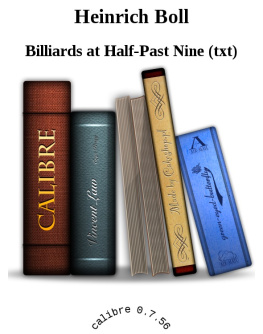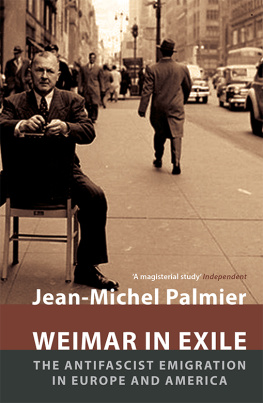Heinrich Bll
Billiards at HalfPast Nine
First published in 1962
One
This morning, for the first time ever, Faehmel was curt with her, almost rude. He called about halfpast eleven and the very sound of his voice over the phone spelt trouble. The tone was new to her, and frightening, precisely because everything he said was, in fact, as irreproachable as always. But in this new voice all courtesy had been reduced to mere formula, as if he were suddenly offering her a glass of H 2 O instead of water.
If you please, he said, look in your desk and get that little red card I gave you four years ago. She pulled out the drawer, pushed aside a chocolate bar, some cleaning cloths, the metal polish and took out the red card. Now, be so kind as to read what it says on the card.
Voice trembling, she read: Available at any time to my mother, my father, my daughter, my son or Mr. Schrella. Otherwise to no one.
Repeat the last sentence, please. She didOtherwise to no one.
And by the way, how did you find out that phone number I gave you was the Prince Heinrich Hotel? She said not a word. I want to stress the fact youre to follow my instructions even when they date back four years if you please.
Not a peep out of her.
Stupid thing! The inevitable if you please, had he forgotten it?
She heard muttering, then a voice calling, Taxi, taxi, after which the connection was cut off. She laid down the receiver, shoved the little red card into the center of the desk and felt a kind of relief. His rudeness, the first in four years, was almost like a caress.
When she was at sixes and sevens, or fed up with the extremely routine nature of her work, she would go out of doors and polish the brass nameplate: Dr. Robert Faehmel. Architectural Estimates. Closed Afternoons. Train smoke, street dust, smog gave her a daily excuse to use the cloths and metal polish, and she liked to stretch out the chore to a quarter, a half-hour. Now, across the way, she could see the printing presses stamping away, tirelessly impressing edification on white paper. She felt their vibration, imagined herself on a ship about to get under way, or already out at sea. Trucks, apprentices, nuns. Life in the streets, crates in front of the grocers, oranges, tomatoes, cabbages. Next door, in front of Gretz shop, two butcherboys were hanging up the wild boar, as they did every day. Dark boars blood was dripping onto the asphalt. Defiance welled up in her. She thought what it would be like to give notice and go to work in some grimy, backyard hole-in-the-wall where electric cable or spices or onions were sold, where sloppily suspendered middle-aged foremen had ideas, thus providing the satisfaction of giving them the brush-off. Places where you had to put up a battle to get that extra hour to spend waiting at the dentists. Where a collection was taken up when one of the girls got engaged, or had a stork shower. Or to buy a book on love. Where your fellow-workers dirty jokes kept you alive to the fact that you, yourself, were a virgin. Life. Quite different from this perfect order, this flawlessly dressed and unfailingly polite employer who gave you the creeps. There was contempt, you could sense, behind the politeness he handed out to everyone he came in contact with. Yet who, actually, who outside herself did he have anything to do with? As far back as she could remember, shed never seen him talking to anyone, except his father, son or daughter. His mother shed never laid eyes on. She was off in a mental hospital somewhere. Nor had that Mr. Schrella, also on the red card, ever set foot in the office. Faehmel meanwhile held no office consultations. Clients who phoned for an appointment were asked to state their business in writing.
When he caught her making a mistake, he merely passed it off with a wave of his hand, and said, All right, now do it over, please. As a matter of fact this seldom happened; the few errors that crept in she usually discovered first herself. In all events, that please of his he never forgot. When she asked him for time off, he gave it to her, hours, days. The time her mother died, he said, Well close the office for four days. Or would you rather have a week? But she hadnt wanted a week, not even four days. Only three, and even that was too long in the empty apartment. Needless to say, he showed up for the funeral and graveside services, and his father, his son and daughter also put in an appearance, all of them bringing enormous wreaths which they laid on the grave themselves. They listened closely to the liturgy, and the old father, whom she liked, whispered to her, We Faehmels know death very well. Were on a solid footing with that fellow, my dear child.
Every favor she wanted was granted without demur and as a result she found it harder and harder, as the years slipped by, to make any requests at all. He had progressively cut down her working hours. During the first year she had worked from eight till four. But for the past two years her work had become so organized she could easily get it done between eight and one. Even so she had time to be bored, to drag out the cleaning chore to a half-hour. And now not as much as a single cloudy spot left on the brass sign! She screwed the cap of the metal polish back on, folded the rags and heaved a sigh. The printing presses were still pounding away, tirelessly impressing edification on white paper, the boar carcass was still dripping blood. Apprentices, trucks, nuns. Life in the streets.
There it lay on the desk, the red card with Otherwise to no one in the flawless architects writing. There, too, was the phone number which, having time on her hands, blushing at her own curiosity, she had identified as the Prince Heinrich Hotels. The name had provided fresh scent for her nose to follow. What did he do in the Prince Heinrich Hotel every morning between halfpast nine and eleven? That icy voice on the phone, saying, Stupid thing. And without any please after it! The departure from style cheered her up, reconciled her with a job any automaton could manage.
Among the carbon copies left behind by her predecessor she had found two form letters, both of which had continued in use unchanged during the years of her regime. One was for clients who had placed a commission: Thank you for your confidence, which we shall try to justify by speedy and accurate fulfillment of your assignment. Respectfully yours. The other was used when stress and strain data and the like were delivered to clients: Herewith the desired information concerning construction project X. Kindly credit the fee, in the amount of Y, to our bank account. Respectfully yours. Certain variations, of course, were left to her. For X she might insert Publishers house at the edge of the forest,
Teachers house on riverbank,
Holleben Street railway bridge. The fee entered at Y, too, she figured out herself, according to a simple scale.
Beyond this there was the correspondence with his three associates, Kanders, Schrit and Hochbret, to whom she had to forward the commissions in turn as they came in. This way, Faehmel had said, justice automatically runs its course and the odds are even for a lucky break. When the data came back, Schrit had to go over Kanders figures, Kanders over Hochbrets, Hochbret over Schrits. There were also card indexes to be kept, bills for expenses to be entered in a ledger, drawings to photocopy and double postcard-size extra photocopies to be made for his private records. But mostly her work consisted of getting letters ready to mail, again and again drawing the sticky side of green, red or blue stamps with President Heuss picture on them across the little sponge and pasting them on neatly at the upper right-hand corner of the yellow envelopes. From time to time the Heusses needed were brown, violet or yellow, and even that much was a welcome change.
Next page





